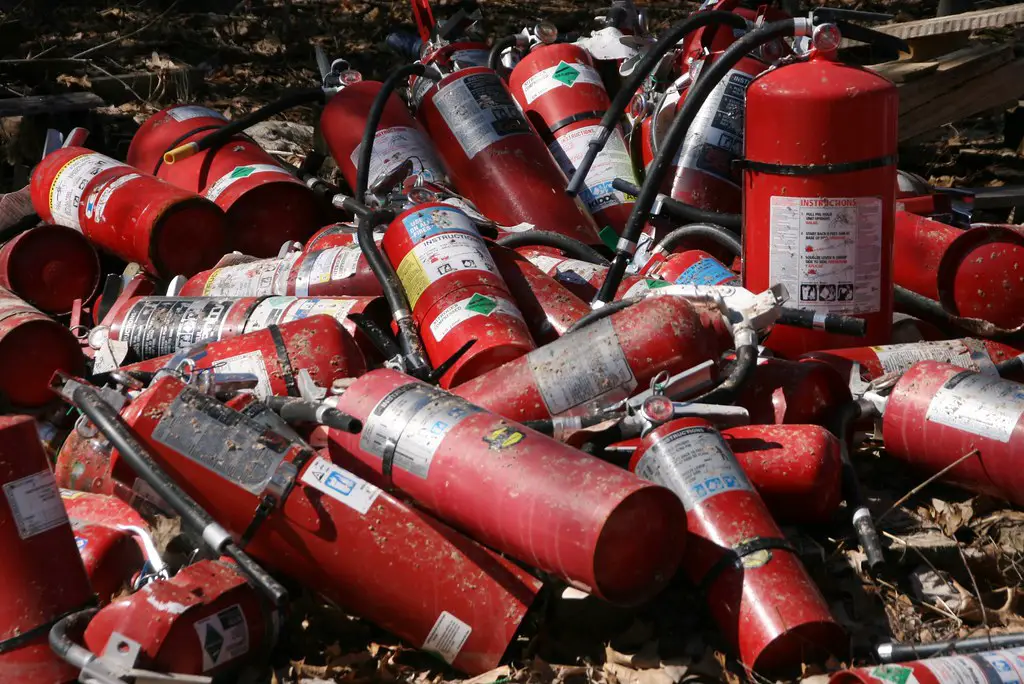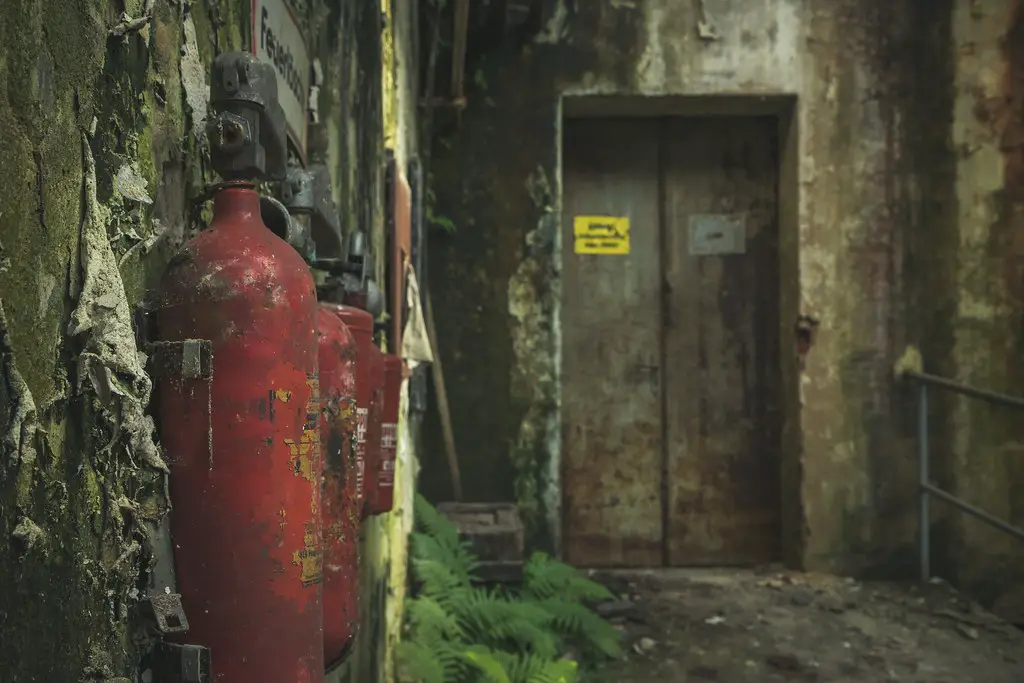When it comes to fires, fire extinguishers are essential in putting out the flames quickly and effectively. However, when the fire extinguisher is no longer needed, it can be difficult to dispose of properly.
Knowing how to properly dispose of a fire extinguisher is important to ensure the safety of our environment and protect the health of those around us.
The good news is that disposing of a fire extinguisher doesn’t have to be difficult. With the right knowledge and preparation, you can make sure that you’re disposing of a fire extinguisher correctly and safely. 1.35 million fires resulted in about 4000 deaths in only 2021 according to NSC injury facts. This tells us about the importance of fire extinguishers and their disposal.
Type Of Fire Extinguisher
When it comes to fire extinguishers, there are a variety of types that are designed to combat different types of fires. The most common types of fire extinguishers are water, foam, CO2, powder, water mist, and chemicals. Each type is designed to work best on particular types of fires and can help protect against the potential loss of life, injury, and property damage.
1. Water Fire Extinguishers
Extinguishers made of water are commonly used to fight combustible fires caused by materials such as wood, paper, and cloth. Water extinguishers work by cooling the fire’s source, reducing the amount of oxygen, and thus, smothering the fire.
2. Foam Fire Extinguishers
Foam extinguishers are intended to fight flammable liquid-based fires. By forming a blanket over the flames, foam fire extinguishers cool the fire and stop it from spreading.
3. CO2 Fire Extinguishers
CO2 fire extinguishers are designed to fight fires caused by electrical and flammable gas sources. CO2 fire extinguishers work by smothering the fire, reducing the amount of oxygen, and eliminating the risk of an explosion or flashover.
4. Powder Fire Extinguishers
Fires are smothered by powder fire extinguishers. This type of extinguisher is most effective on flammable liquids and electrical fires, as the powder smothers the fire and also helps to cool it.
5. Water Mist Fire Extinguishers
The water mist fire extinguisher uses fine mists of water to smother and cool the fire. Extinguishers of this type work best when fires involve flammable liquids, such as gasoline, diesel, or paraffin.
6. Chemical Fire Extinguishers
A chemical fire extinguisher smothers and cools a fire with a special type of chemical. As the chemical smothers the fire and cools it, this extinguisher is most useful on fires involving flammable liquids.
When it comes to choosing the right type of fire extinguisher for your needs, it’s important to consider the types of fires you may encounter in your home or office, as well as the advantages and disadvantages of each type. Each type of fire extinguisher has its advantages and disadvantages, so it’s important to make an informed decision.
How Do I Know It’s Time To Replace My Fire Extinguisher?
The most obvious sign that it’s time to replace your fire extinguisher is that it’s expired. All fire extinguishers come with a readable expiration date. If you’re unsure when your fire extinguisher was purchased, take a look at the manufacturer’s label for the date. If your fire extinguisher has expired, it’s time to replace it.
The nozzle of the hose may also be damaged, chipped, or clogged with debris. Debris can block the spray and prevent the fire extinguisher from functioning correctly. If you notice any signs of wear or damage, it’s a good idea to replace your fire extinguisher.
The locking metal pin on the handle of the fire extinguisher is another indicator that it’s time to replace it. This pin is designed to keep the handle in place and help secure the fire extinguisher to the wall. If the pin is missing, your fire extinguisher needs to be replaced immediately.
Finally, if the handle of your fire extinguisher is shaky or broken, it’s time to replace it. The handle is an essential part of the fire extinguisher and it must be in good condition to ensure it works properly. If the handle is damaged, it’s high time to get a new fire extinguisher.
How To Dispose Of Fire Extinguisher

Fire extinguishers are essential pieces of safety equipment in any home or workplace, but when their time is up, how do you dispose of them properly? It’s important to know the right way to dispose of fire extinguishers to protect yourself, your property, and the environment. Let’s look at some disposal methods.
1. Donation:
One of the best ways to dispose of a fire extinguisher is to donate it. Fire extinguisher donation programs have been set up in many communities, allowing people to donate their used fire extinguishers for reuse.
These programs not only help to reduce the amount of hazardous waste created but also help to ensure that fire extinguishers are still being used in the community.
Before donating a fire extinguisher, it is important to ensure it is in safe working condition. If the fire extinguisher is beyond its effective life, it should be properly disposed of according to local regulations. It is also important to check that the fire extinguisher is empty, as pressurized chemicals can cause damage if they are not handled properly.
Once a fire extinguisher is determined to be in good condition, the next step is to contact a local donation program to arrange for the donation. Many donation programs will arrange to pick up the fire extinguisher, while others may require the donor to drop off the extinguisher. It is important to make sure to follow any instructions provided by the donation program, as improper disposal can be a safety hazard.
2. Recycle:
Fire extinguishers can be recycled and reused in many different ways. This not only eliminates waste but also helps reduce our dependence on finite resources.
The most common way to recycle a fire extinguisher is to take it to a local recycling center. Most recycling centers will accept used fire extinguishers and will recycle them for you. Before taking it to the recycling center, make sure that you have drained all the remaining extinguishing agents out of the fire extinguisher. This can usually be done with a tool that is included with your fire extinguisher.
Another option is to recharge your fire extinguisher rather than dispose of it. Recharging your fire extinguisher is a great choice if you want to continue using it and it is still in good condition.
When recharging your fire extinguisher, you will need to make sure that it is empty of any extinguishing agent. Once it is empty, you can then refill it with the appropriate extinguishing agent. You will also need to take it to a certified technician to have it inspected and recharged.
You can check the Earth911 or recharging fire extinguisher company near you online also.
3. Waste Company:
A waste company will be able to provide you with the expertise and knowledge needed to properly dispose of your fire extinguishers. They will be able to provide you with the proper disposal method for your fire extinguishers, whether you have a standard kitchen fire extinguisher or an industrial-size fire extinguisher.
When it comes to disposing of your fire extinguishers, there are a few steps that you need to take. First, you need to make sure that the fire extinguisher has been completely emptied of all of its contents.
Following the manufacturer’s instructions is the best way to accomplish this. It is then necessary to properly identify the fire extinguisher and place it in a special container labeled “hazardous waste”.
The next step in disposing of your fire extinguishers is to ensure that the hazardous materials are safely removed. This can be done by either taking the fire extinguisher to a hazardous waste facility or having it picked up by a waste company.
Once the hazardous material has been removed, the fire extinguisher needs to be disposed of in a manner that is approved by the Environmental Protection Agency.
4. Call the fire department
The proper way to dispose of a fire extinguisher is to call the local fire department. This will ensure that the extinguisher is properly handled and disposed of in an environmentally safe manner. The fire department will typically come to the home or business and pick up the extinguisher. They will then take it to their facility for processing.
At the fire department’s facility, the extinguisher will be inspected and tested to ensure that it is no longer working properly. Any hazardous materials, such as the propellant or other hazardous chemicals, will be removed and disposed of by local, state, and federal regulations. You can contact the fire department by checking this link.
How Long Does A Fire Extinguisher Last?

A fire extinguisher typically lasts 10-12 years, although the exact length of time may vary depending on the specific type of extinguisher and its use. For example, some extinguishers may need to be replaced sooner if they are frequently used or exposed to extreme temperatures.
To ensure that your fire extinguisher is still in proper working order, it is important to regularly check the expiration date and pressure gauge. The pressure gauge should be checked monthly and the extinguisher should be serviced annually by a certified professional. Once the expiration date has passed, the fire extinguisher should be replaced as soon as possible.
Why can’t we just throw away the fire extinguishers?
Fire extinguishers contain highly toxic chemicals that, if simply thrown away, could cause environmental damage, harm to human health, and other dangerous consequences for the local community.
Additionally, Fire extinguishers are made with several components that need to be disposed of safely. If these components are not disposed of properly, they can have serious consequences for the environment.
Conclusion
Properly disposing of a fire extinguisher is an important task to ensure safety and prevent any accidents. Following the steps outlined above, you can safely and effectively dispose of a fire extinguisher without any complications.
It is essential to follow the proper procedures and guidelines, as improper disposal can have serious consequences. By ensuring that you follow the appropriate procedures and guidelines, you can ensure that your fire extinguisher is disposed of safely and securely.

Gemma Alexander has an M.S. in urban horticulture and a backyard filled with native plants. After working in a genetics laboratory and at a landfill, she now writes about the environment and recycling topics.

